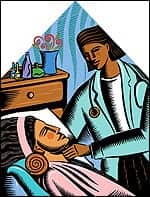A diet that uses injections of the pregnancy hormone hCG to "trick" the body into accepting an ultra-low calorie diet is growing in popularity — and controversy.
Proponents say the diet is safe and effective. But plenty of other doctors say the diet is anything but.
Kelowna, BC (Canada) nurse Debbie Driscoll is currently on the hCG diet for the second time. During the first round, she lost about 25 pounds. She gained a few back and is trying the diet again to lose that weight and then some.
As part of the diet, she’s down to just 500 calories a day. While she says she sometimes feels light-headed, she also says she’s never hungry. "So far I’m down 40 pounds now," Driscoll reports.
"I’ve gone from being classified as severely insulin resistant and probably just a few months away from becoming diabetic, to where I’m no longer insulin resistant anymore and I’m well within the normal ranges."
Every morning, Driscoll gives herself an injection of hCG, or human Chorionic Gonatrophin, a hormone that’s derived from the urine of pregnant women and made into an injection as part of infertility treatments to spark the release of a ripe egg from the ovary.
The idea of using the pregnancy hormone for weight loss was first proposed by doctors in the 1930s. A number of clinical stuides emerged in the 1970s discrediting the diet, but in recent years, the diet has seen a resurgence, mostly among women, who have been seeking out doctors willing to prescribe the hormone for this "off-label" use.
Dr Andrew De Pieri, who runs the De Pieri Clinic in Kelowna, is one of those doctors who prescribes the diet. "I first learned about it at a conference over a year ago in the U.S. when I attended an American Academy of Anti-Aging Medicine program and I have to admit: I was quite skeptical when I first saw it," he tells CTV News.
But when he tried it on patients and found that they lost weight, his skepticism disappeared. He believes it’s a good diet for those who have failed to lose weight with the usual methods.
"People are desperate for weight loss measures. It isn’t just down to diet and exercise and there are people out there who really need this," he says.
After The Dr. Oz Show featured a segment on the diet, the Glenmore HealthCare clinic in Calgary says it saw a surge in interest in the diet. The clinic offers the diet as a one-month program for about $1,000, which includes the daily injections, the counselling on the 500-calorie diet and weekly monitoring.
The clinic has already offered the diet to 300 patients — including the clinic’s director Jeff Russell. He did the diet in January and lost 34 pounds in 30 days. Russell now helps train other doctors about the diet so that they can open up their own clinics.
But as the diet grows in popularity, it’s also attractiing plenty of detractors. Many says there have not been enough high-quality, rigourous studies of the diet’s effects. Others worry taht the hormone can cause side effects when used for weeks at a time, such as blood clots, leg cramps, temporary hair thinning, and constipation.
The FDA has received at least one recent report of an hCG dieter who developed a pulmonary embolism, which is a potentially fatal blood clot in the lung, but it’s unclear what role the hormone played in the event.
More.
[Source: CTV News]


